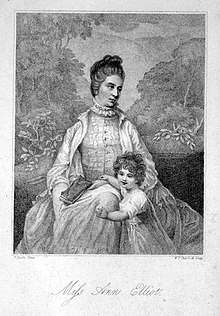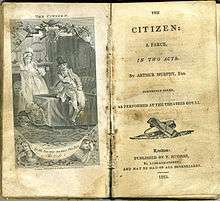Ann Elliot
Ann Elliot (16 November 1743 – 30 May 1769) was a British courtesan and actress. She appeared in comedies in London and Dublin. She had relationships with her mentor Arthur Murphy, with Augustus Hervey, 3rd Earl of Bristol and with Prince Henry, Duke of Cumberland.
Ann Elliot | |
|---|---|
 | |
| Born | 16 November 1743 |
| Died | 30 May 1769 (aged 25) Greek Street, Soho |
| Nationality | Kingdom of Great Britain |
| Other names | Miss Hooper |
| Occupation | Actor |
Life
Elliot was born in Tonbridge in 1743 to Mary and Richard Elliot. Her father was the sexton of the local church. Elliot became a servant in London before she was known as a high class courtesan under the name of "Miss Hooper". She met Arthur Murphy who was a barrister and writer.[1]

An example of Murphy's theatrical writings is The Citizen, a farce, first produced at Drury Lane in 1761. The play included Elliot as Maria. Ann was Murphy's protege and mistress. David Garrick was disparaging about her acting, but he did offer her a contract. However Garrick did not say that he would pay her so she went to Spranger Barry's Crow Street Theatre in Dublin.[1][2] She returned to work in London spending three years in comedies at Covent Garden. In about 1765 Augustus Hervey, 3rd Earl of Bristol wanted her to leave the stage and become his mistress.[1] Hervey was known as the "English Casanova". Her friendship with Murphy continued. In 1767 she took the role of Mary Ann in his new play "A School for Guardians". Murphy was given the profits from two of the six nights it was performed and he gave that money to Elliot.[1]
Death and legacy
Elliot died after a long illness in a house in Greek Street in Soho that had been given to her by the Duke of Cumberland. Cumberland was the King's younger brother and she had been his mistress. She left thousands of pounds to her family including a contribution by the Duke. He arranged for her body to be buried and for a memorial to be created that includes lines attributed to Arthur Murphy.[1]
After her death an anonymous biography appeared of her life noting how Arthur Murphy was devoted to her and how he missed her after her death. After Arthur Murphy's death this relationship was written about by Fanny Burney who found Murphy's devotion to Eliot fascinating.[3]
References
- "Elliot, Ann (1743–1769), courtesan and actress | Oxford Dictionary of National Biography". www.oxforddnb.com. doi:10.1093/ref:odnb/64332. Retrieved 2019-04-12.
- Margaret Doody (14 April 2015). Jane Austen's Names: Riddles, Persons, Places. University of Chicago Press. pp. 195–. ISBN 978-0-226-15783-2.
- D. Cook; A. Culley (13 April 2016). Women's Life Writing, 1700-1850: Gender, Genre and Authorship. Springer. pp. 81–85. ISBN 978-1-137-03077-1.